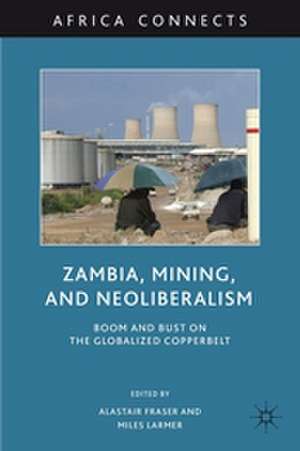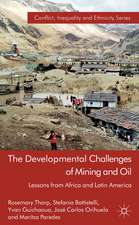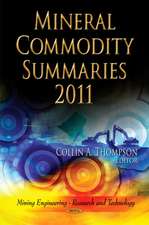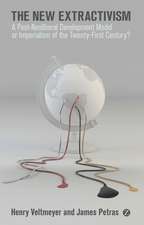Zambia, Mining, and Neoliberalism: Boom and Bust on the Globalized Copperbelt: Africa Connects
Editat de A. Fraser, M. Larmeren Limba Engleză Hardback – 19 ian 2011
| Toate formatele și edițiile | Preț | Express |
|---|---|---|
| Paperback (1) | 638.89 lei 6-8 săpt. | |
| Palgrave Macmillan US – 19 ian 2011 | 638.89 lei 6-8 săpt. | |
| Hardback (1) | 641.85 lei 6-8 săpt. | |
| Palgrave Macmillan US – 19 ian 2011 | 641.85 lei 6-8 săpt. |
Preț: 641.85 lei
Preț vechi: 755.13 lei
-15% Nou
Puncte Express: 963
Preț estimativ în valută:
122.83€ • 133.38$ • 103.18£
122.83€ • 133.38$ • 103.18£
Carte tipărită la comandă
Livrare economică 23 aprilie-07 mai
Preluare comenzi: 021 569.72.76
Specificații
ISBN-13: 9780230104983
ISBN-10: 0230104983
Pagini: 298
Ilustrații: XXI, 298 p. 6 illus.
Dimensiuni: 140 x 216 x 23 mm
Greutate: 0.46 kg
Ediția:2010
Editura: Palgrave Macmillan US
Colecția Palgrave Macmillan
Seria Africa Connects
Locul publicării:New York, United States
ISBN-10: 0230104983
Pagini: 298
Ilustrații: XXI, 298 p. 6 illus.
Dimensiuni: 140 x 216 x 23 mm
Greutate: 0.46 kg
Ediția:2010
Editura: Palgrave Macmillan US
Colecția Palgrave Macmillan
Seria Africa Connects
Locul publicării:New York, United States
Cuprins
Boom and bust on the Zambian Copperbelt; A.Fraser Historical Perspectives on Zambia's Mining Booms and Busts; M.Larmer The Economics of the Copper Price Boom in Zambia; C.S.Adam & A.M.Simpasa From Boom to Bust: Diversity and Regulation in Zambia's Privatised Copper Sector; D.Haglund Raw Encounters: Chinese Managers, African Workers and the Politics of Casualization in Africa's Chinese Enclaves; C.Kwan Lee African Miners and Shape Shifting Flight Capital: The Case of Baluba Luanshya; J.Gewald & S.Soeters Contesting Illegality: Women in the Informal Copper Business; P.Mususa The Mining Boom, Capital and Chiefs in the 'New Copperbelt'; R.Negi Mining, Dispossession and Transformation in Africa; R.Bush
Recenzii
'The value of this volume is that it goes beyond an analysis of the institutions and ideologies that de-industrialized the Zambian economy and begins to explore the possibilities of an alternative.' African Affairs
"The scholarly research that has gone into this book shows the critical importance for Africa to secure control over both its natural resources and the financial, managerial, and technological support structure to harness those resources. The moral of the story behind Zambia's copper industry is that if assistance is needed from outside, it must not be part of a donor driven aid package." - Yash Tandon, author of Ending Aid Dependence
"Althoughprevious calculations had estimated that Zambia's copper will be exhausted by 2020, thanks to new technologies, it is now estimated that there is enough copper that can be mined profitably until almost the end of the present century. Hence, notwithstanding current attempts at diversification of the economy away from mining, Zambia's mining sector, including copper, cobalt, and gem stones, willcontinue to act as a principle engine of growth and development for quite some time to come. This reader provides a comprehensive coverage of the historical, economic, political, social and technological issues relating to mining in Zambia. It makes for compelling reading for students of development and compulsory reading for those interested in Zambia's mining sector." - Venkatesh Seshamani, Professor of Economics, University of Zambia
"The contents of this excellent collection will alternately enrage the reader with its documentation of the astoundingly unfair conditions of the privatization of Zambia's copper mines which have so far succeeded in preventing any fair distribution of the economic benefits of the post-2004 boom in copper prices, and bring hope with its insightful accounts of the determined struggles by Zambian people to change this iniquitous situation. This book is a wonderful contribution to the rich literature on the Zambian Copperbelt which has for so long been a testing ground for the complex inter-relationships between mineral dependent economic growth, global forces, internal development trajectories, and political and social change in developing countries." - Deborah Potts, Cities Research Group, Geography Department, King's College London, UK
"Zambia's copper mines are back in business . . .in a very different world with increasing varieties of capitalisms. Zambia now has to relate to the BRICs and not the NAM; to a China of the Olympics rather than Tazara. But the developmental vision of such novelresource governance remains almost as problematic as when Cecil Rhodes had a dream. A new, engaged generation of analysts examine local to global prospects at the turn of another decade and era." - Timothy M. Shaw, Professor and Director, Institute of International Relations at The University of the West Indies
"So-called policy reform in Zambia, driven by the World Bank and the IMF, was a scandal that deindustrialized the economy, impoverished the Copperbelt, and fostered rampant corruption. Fraser and Larmer's Zambia, Mining and Neoliberalism offers the definitive analysis of this sorry tale." - John Weeks, Professor Emeritus, SOAS, University of London, UK
"Fraser and Larmer's book Zambia, Mining and Neoliberalism: Boom and Bust in the Globalized Copperbelt is perhaps one of the best books to be written on the Zambian copper industry in the last four decades. This collection of essays analyzes the contemporary political economy of Zambia's copper industry and locates the struggles for the control of the country's mineral wealth within the context of globalized capitalism. Rich in empirical detail, this book provides a fresh theorization on the problems faced by resource-dependent economies in negotiating favorable terms from their mineral wealth when faced with pressures from foreign multinationals on one hand and local communities on the other, under an uncertain international economic environment. This is a remarkable, ground-breaking contribution to the literature on African development in general and mining development in particular, as it uses the Zambian case to illustrate the difficult choices that political leaders have to make and the pressures they face in trying to realize realistic returns from mineral wealth. It should be essential reading for anyone who wants to understand how global capitalism impacts the negotiating power of resource-rich developing countries and how mineral price volatility has constrained the space for political leaders to extract attractive concessions from multinational corporations with negative effects to their populations." - Neo Simutanyi, Executive Director, Centre for Policy Dialogue, Lusaka, Zambia
"This uncommonly tight, timely, and intellectually sharp volume sets the recent history of boom and bust in the Zambian mining economy in a longer historical timeframe. Its key contribution lies in demonstrating precisely why neo-liberal orthodoxies have served Zambia so poorly." - Paul Nugent, Professor of Comparative African History, University of Edinburgh, UK
"The scholarly research that has gone into this book shows the critical importance for Africa to secure control over both its natural resources and the financial, managerial, and technological support structure to harness those resources. The moral of the story behind Zambia's copper industry is that if assistance is needed from outside, it must not be part of a donor driven aid package." - Yash Tandon, author of Ending Aid Dependence
"Althoughprevious calculations had estimated that Zambia's copper will be exhausted by 2020, thanks to new technologies, it is now estimated that there is enough copper that can be mined profitably until almost the end of the present century. Hence, notwithstanding current attempts at diversification of the economy away from mining, Zambia's mining sector, including copper, cobalt, and gem stones, willcontinue to act as a principle engine of growth and development for quite some time to come. This reader provides a comprehensive coverage of the historical, economic, political, social and technological issues relating to mining in Zambia. It makes for compelling reading for students of development and compulsory reading for those interested in Zambia's mining sector." - Venkatesh Seshamani, Professor of Economics, University of Zambia
"The contents of this excellent collection will alternately enrage the reader with its documentation of the astoundingly unfair conditions of the privatization of Zambia's copper mines which have so far succeeded in preventing any fair distribution of the economic benefits of the post-2004 boom in copper prices, and bring hope with its insightful accounts of the determined struggles by Zambian people to change this iniquitous situation. This book is a wonderful contribution to the rich literature on the Zambian Copperbelt which has for so long been a testing ground for the complex inter-relationships between mineral dependent economic growth, global forces, internal development trajectories, and political and social change in developing countries." - Deborah Potts, Cities Research Group, Geography Department, King's College London, UK
"Zambia's copper mines are back in business . . .in a very different world with increasing varieties of capitalisms. Zambia now has to relate to the BRICs and not the NAM; to a China of the Olympics rather than Tazara. But the developmental vision of such novelresource governance remains almost as problematic as when Cecil Rhodes had a dream. A new, engaged generation of analysts examine local to global prospects at the turn of another decade and era." - Timothy M. Shaw, Professor and Director, Institute of International Relations at The University of the West Indies
"So-called policy reform in Zambia, driven by the World Bank and the IMF, was a scandal that deindustrialized the economy, impoverished the Copperbelt, and fostered rampant corruption. Fraser and Larmer's Zambia, Mining and Neoliberalism offers the definitive analysis of this sorry tale." - John Weeks, Professor Emeritus, SOAS, University of London, UK
"Fraser and Larmer's book Zambia, Mining and Neoliberalism: Boom and Bust in the Globalized Copperbelt is perhaps one of the best books to be written on the Zambian copper industry in the last four decades. This collection of essays analyzes the contemporary political economy of Zambia's copper industry and locates the struggles for the control of the country's mineral wealth within the context of globalized capitalism. Rich in empirical detail, this book provides a fresh theorization on the problems faced by resource-dependent economies in negotiating favorable terms from their mineral wealth when faced with pressures from foreign multinationals on one hand and local communities on the other, under an uncertain international economic environment. This is a remarkable, ground-breaking contribution to the literature on African development in general and mining development in particular, as it uses the Zambian case to illustrate the difficult choices that political leaders have to make and the pressures they face in trying to realize realistic returns from mineral wealth. It should be essential reading for anyone who wants to understand how global capitalism impacts the negotiating power of resource-rich developing countries and how mineral price volatility has constrained the space for political leaders to extract attractive concessions from multinational corporations with negative effects to their populations." - Neo Simutanyi, Executive Director, Centre for Policy Dialogue, Lusaka, Zambia
"This uncommonly tight, timely, and intellectually sharp volume sets the recent history of boom and bust in the Zambian mining economy in a longer historical timeframe. Its key contribution lies in demonstrating precisely why neo-liberal orthodoxies have served Zambia so poorly." - Paul Nugent, Professor of Comparative African History, University of Edinburgh, UK
Notă biografică
ALASTAIR FRASER is the Philomathia Fellow and College Lecturer in Politics at Cambridge University, UK.
MILES LARMER is Lecturer in International History at the University of Sheffield, UK.
MILES LARMER is Lecturer in International History at the University of Sheffield, UK.













